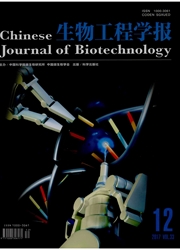

 中文摘要:
中文摘要:
蛋白质是生理功能的执行者,是生命现象的直接体现者,蛋白质组学旨在阐明生物体全部或部分蛋白质在生命活动中的作用和功能。随着组学理论基础和技术方法的逐渐成熟,蛋白质组学的研究被提高到了前所未有的高度。放线菌与人类的生产和生活关系极为紧密,是产生抗生素和酶制剂的主要来源。近130多年的放线菌系统学研究和2001年模式菌株的全基因组测序,为功能基因组研究奠定了基础。与先前的基因组学和转录组学相比,放线菌蛋白质组学能更直接、更准确地解释生命现象,得到了快速发展,并受到研究者的高度关注。近年来放线菌蛋白质组学的研究主要包括复杂形态分化和发育过程、非凡的环境适应能力、与植物共生固氮、代谢机理及特殊功能、病原放线菌致病性和筛查天然产物等几个方向,为进一步促进放线菌蛋白质组学发展奠定了基础。
 英文摘要:
英文摘要:
Protein is the executor of physiological function, and direct embodiment of the life phenomena. Proteomics aims to systematically clarify all or parts of proteins' role and function in life movement. In post genome era, proteomics began to play more important role in life science field. Actinobacteria are closely linked to human production and life, which have produced many clinically important secondary metabolites, including antibiotics, antitumorals and enzymes. Actinobacterial systematics and its model organism Streptomyces coelicolor in 2001 genome sequence laid the foundation for further functional genomic studies. Actinobacterial proteomics was more directly and exactly to interpret the activity of life than genomics and transcriptomics, which grew much faster and received so much attention from scientists in the near years. Complex morphological differention, stronge environment adaptiveness, nitrogen-fixing capacity, metabolic mechanism, pathogenicity and natural produces' discovery were systematically reviewed in this study, which was expected to be the basis for promoting Actinobacterial proteomics study in the near future.
 同期刊论文项目
同期刊论文项目
 同项目期刊论文
同项目期刊论文
 Purification and properties of a SDS-resistant xylanase from halophilic Streptomonospora sp. YIM 904
Purification and properties of a SDS-resistant xylanase from halophilic Streptomonospora sp. YIM 904 Development of a rapid high-efficiency scalableprocess for acetylated Sus scrofa cationic trypsin pr
Development of a rapid high-efficiency scalableprocess for acetylated Sus scrofa cationic trypsin pr Quantitative proteomics reveals significant changes incell shape and an energy shift after IPTG indu
Quantitative proteomics reveals significant changes incell shape and an energy shift after IPTG indu Phosphoproteomic Analysis of the MHCC97-H Cell LineReveals the Spliceosome Associated with Metastasi
Phosphoproteomic Analysis of the MHCC97-H Cell LineReveals the Spliceosome Associated with Metastasi Systematic analysis of missing proteins provides an elucidative clue to define all the protein-codin
Systematic analysis of missing proteins provides an elucidative clue to define all the protein-codin Chromosome 8-Coded Proteome of Chinese Chromosome Proteome Data set (CCPD) 2.0 with Partial Immunohi
Chromosome 8-Coded Proteome of Chinese Chromosome Proteome Data set (CCPD) 2.0 with Partial Immunohi Special Enrichment Strategies Greatly Increase the Efficiency of Missing Proteins Identification fro
Special Enrichment Strategies Greatly Increase the Efficiency of Missing Proteins Identification fro Systematic analysis of transcriptome, translatome andproteome provides a global view and potential s
Systematic analysis of transcriptome, translatome andproteome provides a global view and potential s Systematical analysis of missing proteins provides anelucidative clue to define all the protein-codi
Systematical analysis of missing proteins provides anelucidative clue to define all the protein-codi The Tissue-Based Proteogenomics Analysis Reveals thatHuman Testis Endows Plentiful Missing Proteins.
The Tissue-Based Proteogenomics Analysis Reveals thatHuman Testis Endows Plentiful Missing Proteins. Rapid development of proteomics in China: from the perspective of the human liver proteome project a
Rapid development of proteomics in China: from the perspective of the human liver proteome project a First proteomic exploration of protein-encoding genes on chromosome 1 in human liver, stomach, and c
First proteomic exploration of protein-encoding genes on chromosome 1 in human liver, stomach, and c Proteome atlas of human chromosome 8 and its multiple 8p deficiencies in tumorigenesis of the stomac
Proteome atlas of human chromosome 8 and its multiple 8p deficiencies in tumorigenesis of the stomac Qualitative and quantitative expression status of the human chromosome 20 genes in cancer tissues an
Qualitative and quantitative expression status of the human chromosome 20 genes in cancer tissues an Protein profiling of active cysteine cathepsins in living cells using an activity-based probe contai
Protein profiling of active cysteine cathepsins in living cells using an activity-based probe contai Systematic research on the pretreatment of peptides for quantitative proteomics using a C18 microcol
Systematic research on the pretreatment of peptides for quantitative proteomics using a C18 microcol Systematic analysis of missing proteins provides clues to help define all of the protein-coding gene
Systematic analysis of missing proteins provides clues to help define all of the protein-coding gene Quantitative proteomics reveals significant changes in cell shape and an energy shift after IPTG ind
Quantitative proteomics reveals significant changes in cell shape and an energy shift after IPTG ind 期刊信息
期刊信息
